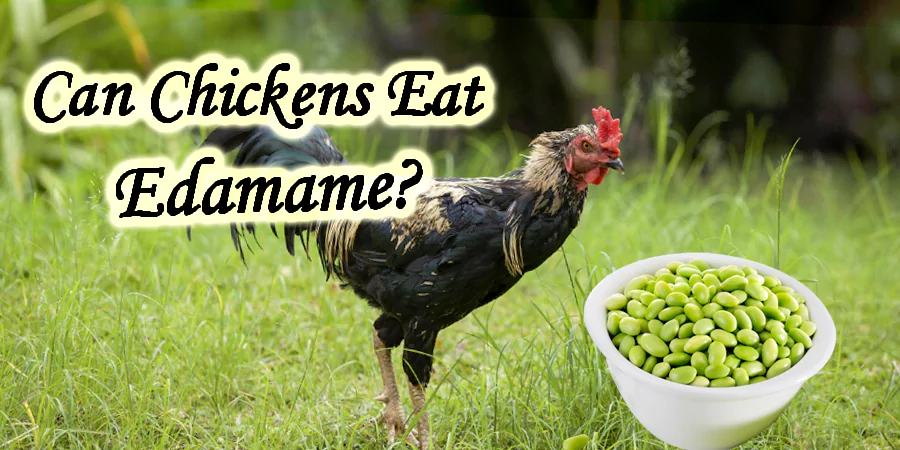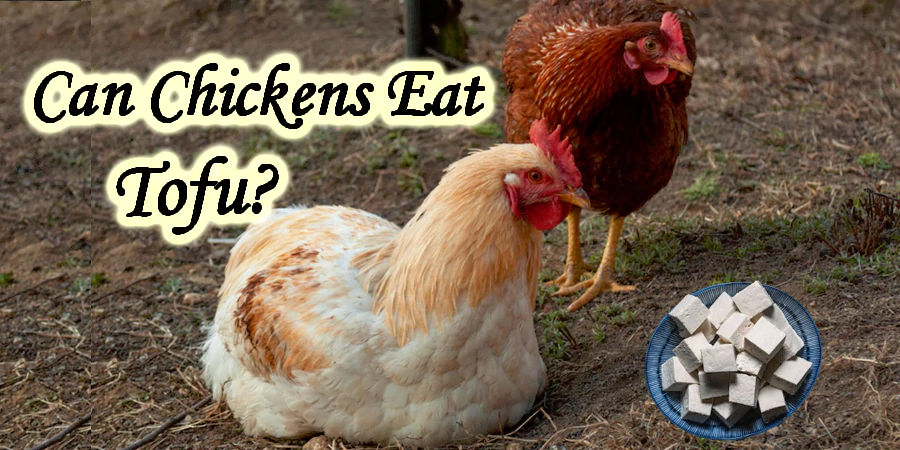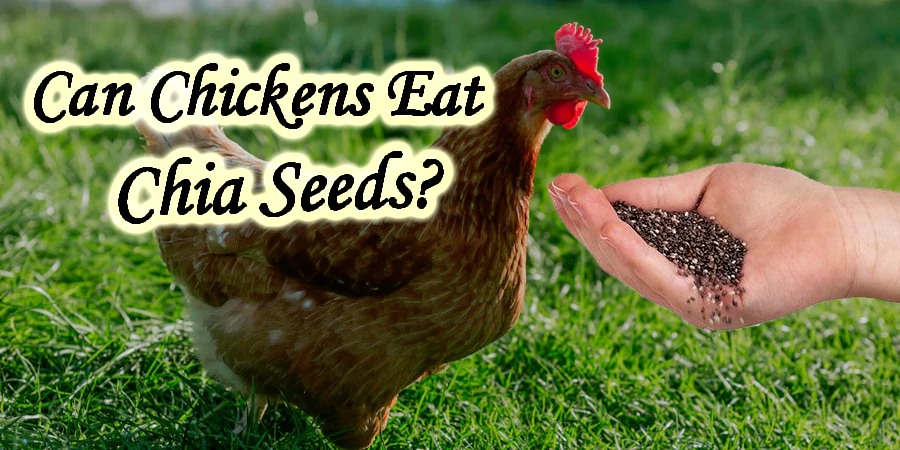Can Chickens Eat Edamame? Exploring the Benefits and Risks
Published: 3 Apr 2024
Edamame has gained massive attention from chicken enthusiasts. Some of them are pondering on its suitability for their flock with this query: can chickens eat Edamame soybean? Yes, chickens can have Edamame with some safety guide. The most important contributor factor is the nutritional value of the diet. To resolve this old-age query we will delve into the nutritional benefits and potential hazards of feeding Edamame. We will explore the best practices and procedures to serve Edamame which ensure the safe and healthy growth of our beloved chickens. So grab a cup of coffee and join us throughout the journey of culinary delights for poultry.

Can Chickens Eat Edamame? Let’s start our exploration
Is Edamame a Healthy Diet for Chickens?
Edamame is a safe and healthy dietary option if served responsibly. Although Edamame does not contain toxic content but must be served in moderation. It is a healthy option to diversify the chicken’s diet plan. It is mandatory to observe the response from the flock and consult with a veterinarian.
Nutritional Profile of Edamame for Chickens
The nutritional value of Edamame may vary according to the type of Edamame and cooking process. In any case, Edamame provides a diverse range of nutrients for chickens. Here is a detailed breakdown of its nutritional profile.
- Proteins: Edamame contains a high volume of protein content. It has 11 grams of protein in 100 grams of cooked Edamame.
- Fiber: Fiber improves the digestive process and regulates the blood sugar level. It contains 5 grams of fiber content in 100 grams.
- Carbohydrates: Edamame has a lower carbohydrate value as compared to other seeds or legumes. It has 9 grams of carbohydrates per 100 grams.
- Fats: Edamame contains monounsaturated and polyunsaturated fat content. It has 5 grams of fat content in 100 grams of Edamame.
- Vitamins: Edamame has Vitamins K, C, and B9. The nutrients promote immune efficiency, blood clotting, increase bone strength, & well-being.
- Minerals: Edamame is packed with minerals. It contains magnesium, calcium, potassium, and iron content. Minerals improve overall health.
| Nutrient | Value Per 100 g | Nutrient | Value Per 100 g |
|---|---|---|---|
| Protein | 11 grams | Vitamin C | 6-9 mg |
| Carbohydrates | 9 grams | Folate | 122-200 mcg |
| Fat | 5 grams | Iron | 1.8-2.2 mg |
| Dietary Fiber | 5 grams | Magnesium | 50-60 mg |
| Vitamin K | 50-75 mcg | Potassium | 436-484 mg |
The above mentioned value can vary according to your location and serving technique.
How to prepare Edamame for Chickens?
Proper preparation of Edamame not only provides a nutrient-rich diet but ensures its safe consumption. You should never compromise the safety and well-being of your flock while introducing a new diet. Here are a few simple steps that will help you to ensure the healthy growth of chickens.
- Shelling the Edamame: It is mandatory to shell the Edamame to prevent choking hazards. So, squeeze the pods and remove the beans inside.
- Cooking Process: It is advised to properly cook the beans to make them tender. You can boil or steam them for a few minutes to make them softer.
- Cool down the Beans: You should never serve Edamame beans in hot status. Cool them to the normal temperature and then serve them to chickens.
- Mash the Edamame Beans: You can serve Edamame beans as a whole but better to chop them into small bite-sized pieces.
- Prepare a Mix trail: It is an effective tactic to mix these chopped beans with other seeds or grains (regular diet). It will entice chickens to enjoy it.
How to Serve Edamame to Chickens?
It depends on individual preferences and the location of the backyard coop. Here are some of the most engaging methods usually used by chicken owners to serve Edamame to their flock. Select the method according to your available resources.
- Scattered in the garden: Some chicken enthusiasts favor scattering the cooked beans in the garden and letting chickens peck their share.
- Mixed-Trail: It is useful to mix Edamame beans with a regular diet and serve them in the coop. They will be attracted by their favorite diet.
- Frozen Treat: In the summer season, it is favorable to prepare a frozen treat for your chickens. It will be a good source of hydration with fun.
- Mashed Treat: Serving Edamame as a whole can lead to choking issues for chicks and old chickens. It is better to serve them blended beans.
How Much and How Often To Feed Edamame to Chickens?
One thing is for sure Edamame can’t be served to chickens as their primary diet. Therefore we have to set a limit to the volume and frequency of serving Edamame to our beloved flock. There is no absolute value that we can suggest to you but as a general rule, you can serve Edamame a maximum twice a week. It is better to serve Edamame when egg production season starts because additional protein intake will improve the production.
You should focus on limiting the portion of Edamame to under 5% of the regular diet. It will avoid the risk of diet imbalance. It is estimated that 2 teaspoons of shelled and cooked Edamame is enough for chickens. Carefully monitor their activities after serving Edamame and consult your nearby veterinarian.
Can Chickens Eat Edamame Shells?
No, we are not recommending you to serve Edamame shells or pods. The pods are a tough part of Edamame and can lead to blockage in chickens. Additionally, it contains a high volume of fibrous content which may create digestive issues for your flock. Therefore we suggest you always serve Edamame after removing the shells in a controlled volume (as discussed earlier).
Can Chickens Eat Edamame Skin?
Not recommended. Can Chickens have Edamame Skins is an obvious query from chicken owners? Although Edamame skin does not contain any sort of toxic content, chicken enthusiasts prefer to serve Edamame without skin. The hardness of the skin can create consumption problems in chickens. Sit is more or less the same scenario as we have discussed in the shell portion. So avoid using Edamame skin.
Can Chickens Eat Dried Edamame?
It depends. The nutritional value and texture of Edamame will be changed in the dried form. Dried Edamame is more crunchy and hard compared to cooked Edamame which can cause choking issues. The situation will get worse if Edamame serves as a whole. The concentration of protein, fiber, and other nutrients alters due to the drying process. Dried Edamame lacks in water content which may lead to dehydration issues. So if you want to serve dried Edamame to your chicken then must consider these concerns.
Can Chickens Eat Raw Edamame?
Yes, chickens can have raw Edamame occasionally. It is not an ideal way to serve Edamame to chickens because it is difficult to digest for chickens. The raw beans may challenge chickens in their breakdown. Harder parts of Edamame can pose choking problems for chickens. You can serve raw Edamame to your flock after considering these factors.
Can Chickens Eat Cooked Edamame?
Yes, we recommend you serve cooked Edamame to your chickens. Cooked Edamame can be easily digested because the process breaks down the tougher fibrous ingredients. The cooking process will provide a softer texture that makes it more palatable for chickens. It will work fine like lima beans after cooking. You can mix the cooked Edamame with other grains and seeds (Discussed in later part). Before serving cooked Edamame to chickens it is mandatory to cool them down to room temperature. You must serve cooked Edamame in moderation.
Can chickens eat Edamame Beans?
Yes, Chickens can have Edamame beans as an occasional part of their diet. We have already discussed that Edamame beans are a rich source of fiber, protein, and nutrients which can ensure the overall well-being of chickens. Some chicken experts suggest cooking the Edamame beans to make them more flavorful for chickens. So chickens can eat Edamame seeds in a controlled volume.
Benefits of Feeding Edamame to Chickens
Edamame offers a variety of nutrients that are required for the healthy growth of chickens. We have selected the ten most important benefits of serving Edamame to chickens as an occasional diet. It is important to note that these benefits do not justify the excessive use of Edamame to your flock.
|
Potential Hazards of Edamame to Chickens
It is important to figure out the negative side of feeding Edamame to your flock. Most of the hazards are related to careless serving or over-dependence on Edamame. It is therefore advised to vigilantly monitor the response from your flock and adjust the feed accordingly. Here are some key hazards.
|
How to Minimize these Adverse Effects?
After understanding the potential hazards, now it will be easier for you to take care of your flock. Note down these risks and rectify them one by one. Select the good quality Edamame and get them shelled to prevent choking issues. It is suggested to serve cooked Edamame because it is the more flavorful and tender diet for chickens. Wait till Edamame cools down to room temperature and then serve them to your flock. Never include more than 2% of Edamame in the routine diet of chickens. Careful observation is also a very important factor.
What are the Best alternatives to Edamame for chickens?
There is a variety of nutritious options available to replace Edamame for your flock. We have suggested some of the most common and easily available feeds for chickens. You can select according to your personal preference.
- SEEDS: Seeds can be served occasionally to chickens. It will provide a decent amount of nutrients for the healthy growth of chickens. The most common types of seeds are Flaxseeds, chia seeds, Hemp seeds, etc.
- FRUITS: Chickens love to enjoy fruit’s flesh with a diversified diet plan. You can serve bananas, berries, watermelon, olives, and others. All these fruits are nutrient-rich and full of flavor which is enticing for our beloved flock.
- VEGETABLES: Chickens love to peck at green leafy vegetables. These vegetables are packed with high volumes of vitamins and minerals. Broccoli, carrots, collard greens, cucumbers, and spinach are best.
- MEALWORMS: Protein intake is very compulsory for the effective growth of chickens. Mealworms are rich in protein content. Serving mealworms to your flock with another diet will ensure the overall well-being of chickens.
Conclusion
It is concluded that chickens can eat Edamame in a limited volume. We are convinced that the Edamame portion in the diet must not increase the 2% threshold. Edamame contains a wide range of nutrients essential for the optimal development and egg production of hens. It is packed with vitamins and minerals with the addition of healthy fiber. We recommend our dear fellow chicken keepers to serve cooked Edamame to their flock.
We are awaiting your input in this regard. Together we can make our flocks more productive and healthy. So do comment with your suggestions.

- Be Respectful
- Stay Relevant
- Stay Positive
- True Feedback
- Encourage Discussion
- Avoid Spamming
- No Fake News
- Don't Copy-Paste
- No Personal Attacks

- Be Respectful
- Stay Relevant
- Stay Positive
- True Feedback
- Encourage Discussion
- Avoid Spamming
- No Fake News
- Don't Copy-Paste
- No Personal Attacks


